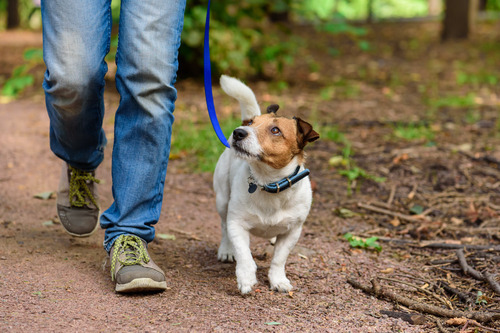What to Do If Your Dog is Bitten by a Snake?
When exploring outdoor areas in Pasadena, the possibility of a snake encounter is real. A snake bite is an emergency situation that can be frightening for both you and your dog, especially if you’re unsure of what to do in the moment. This blog offers guidance on how to respond if your dog is bitten by a snake, what symptoms to watch for, and when to seek urgent veterinary care. With the right knowledge and swift action, you can help protect your dog and ensure they receive timely medical attention. If you suspect your dog has been bitten by a snake, call Altadena Pet Hospital at (626) 798-0738 or book an appointment online to seek the help they need.

Recognizing a Snake Bite in Dogs
Snake bites can happen unexpectedly and vary greatly in severity, depending on the type of snake involved. In California, bites from venomous snakes, like rattlesnakes, can pose a serious threat to your dog’s health.
Immediate Signs of a Snake Bite
Immediately following a bite, you may notice symptoms such as intense pain, swelling, and redness at the bite site. Dogs may yelp or cry, trying to lick or paw at the wound. Typically, a snake bite will create two puncture wounds, which can sometimes be hidden under fur but may show signs of bleeding or bruising. This initial response is your first clue that a bite has occurred.
Symptoms That Develop Over Time
Over the next 30 minutes to several hours, additional symptoms may emerge if the snake’s bite was venomous. Signs such as lethargy, drooling, vomiting, weakness, or labored breathing can indicate a serious reaction. In some cases, dogs experience severe bleeding or clotting issues, making immediate veterinary care essential. If your dog shows any of these symptoms, contact Altadena Pet Hospital at (626) 798-0738 for prompt attention and specialized care.
What to Do Immediately After Your Dog is Bitten
Your quick response following a snake bite can make a significant difference in your dog’s health outcome. While your instinct may be to panic, following these steps can help keep your dog calm and reduce the risk of venom spreading further.
- First and foremost, stay calm. Dogs can sense your stress, and a calm approach can help them stay calm as well.
- Restrict your dog’s movement as much as possible to prevent the venom from spreading through their bloodstream. Gently carry or encourage your dog to lie down and avoid walking if possible.
- Avoid applying ice, using a tourniquet, or trying to suck out the venom, as these methods are not effective and could cause harm. Instead, focus on keeping your dog still and comfortable until you can reach your veterinarian.
- Once you have your dog settled, head directly to Altadena Pet Hospital or your nearest veterinary clinic. Calling ahead can allow our veterinary team to prepare for your dog’s arrival and expedite treatment.
What Happens at Altadena Pet Hospital After a Snake Bite
Once at Altadena Pet Hospital, our veterinary team will quickly assess the bite area, monitor your dog’s symptoms, and take steps to counteract the venom.
Initial Examination and Symptom Monitoring
Your veterinarian will conduct a thorough examination of the bite site, checking for swelling, bruising, and tissue damage. Blood work may be conducted to assess how your dog’s body is responding to the venom and to evaluate clotting factors. Close symptom monitoring is critical in the first few hours following a snake bite.
Administering Antivenom and Supportive Care
If the bite is determined to be from a venomous snake, your veterinarian may administer antivenom. This is most effective when given as soon as possible, helping neutralize the venom and minimize tissue damage. Other supportive treatments, such as intravenous fluids, pain medication, and oxygen therapy, may be provided to help your dog recover comfortably. Call Altadena Pet Hospital at (626) 798-0738 to connect with experienced professionals who can provide the necessary care for snake bites.
How to Prevent Future Snake Bites
While it’s impossible to completely eliminate the risk of snake bites, taking precautions during outdoor activities can help protect your dog. Here’s how to create a safer environment for your pet and minimize encounters with snakes.
Avoid High-Risk Areas During Peak Snake Season
Snakes are more active during warmer months, particularly in the spring and summer. When taking your dog on hikes or walks, avoid areas with tall grass, thick underbrush, and rocky outcrops where snakes are likely to hide. Stick to well-maintained paths to decrease the chance of unexpected encounters.
Snake Training and Awareness for Your Dog
Training your dog to avoid snakes can be an effective preventive measure. Some professional trainers offer snake avoidance training, teaching dogs to recognize and steer clear of snakes. This type of training can be especially helpful if you frequently hike in snake-prone areas. By incorporating these safety habits into your routine, you can help reduce the risk of your dog encountering a snake.
The Importance of Immediate Veterinary Care After a Snake Bite
A quick response and immediate veterinary care are essential when it comes to snake bites. Delayed treatment can lead to more severe complications, especially if the bite was venomous. Venom can cause significant damage to tissues, blood vessels, and even organ systems if not treated quickly, underscoring the need for urgent attention. If your dog has been bitten by a snake, call Altadena Pet Hospital at (626) 798-0738 or book an appointment online. Our veterinary team is prepared to provide your pet with comprehensive and compassionate care when it matters most.
